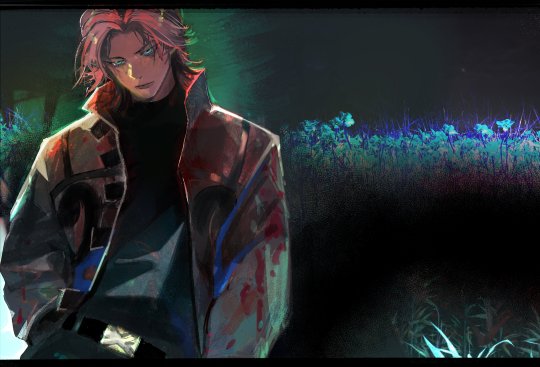#thank you again ririya for doing this!
Explore tagged Tumblr posts
Text
Ririya did all the hard work of translating here - thank you for listening to my long tangents. Here are some of our translation notes - they make some mention of details of Sissia of the Central nation as well, but contain no plot or character spoilers for Jack Jeanne beyond references to shared common route things in the plays.
1) Artemisia is the botanical family mugwort is in. Artemisia princeps is the name of the species.
2) Mugwort in Mugwort castle is written like the English mugwort (マグワート), where as when it’s referring to the crop it uses the Japanese ヨモギ (yomogi) as it does in the play.
3) The Japanese here is specifically Vena not Wena - perhaps the name changed slightly over the generations, or it’s just a stylistic transliteration choice.
4) The word “servant” here is the same one used for the “servant citizens” of Quatra in Sissia of the Central Nation.
5) The line “step ashore, and you will never be able to return to the other side” is word for word what the priest says to Chicchi in the play’s first scene. The words for fame and money here are also the same.

6) Raham likely comes from the biblical/litergical Hebrew “רחם “ racham - meaning pity or compassion, often of god to man, but sometimes of people to each other.

It seems like over time, the phrase morphed into the Oh Rama Havenna we know, with a syllable moving. (interestingly, the grammatically more correct version would have been O Raham HaVena, with Ha being the word for “the” and being attached to the word following it)
7) “O Lord, bring punishment upon those corrupted by greed.” is written in a very specifically religious phrasing and uses words and writing that are difficult to parse and translate. This was the most time consuming part of the whole poem to try to translate. It’s a very “Neji mixing idiosyncratic writing quirks with very specific references” line.
8) the term for base in “the rebel army made their base on the island in the lake.” is 根城 whose kanji directly translates as ‘root castle’ and read as “Nejiro” - the first kanji is the "Ne" of Neji’s last name, too.
9) “those with hidden wounds of guilt” is an attempt to translate a Japanese idiom. The line in the original poem is written “すねに傷をもつ” and means “wounds on their shins”, an idiom used to mean ‘a guilty conscience’.
It is an interesting inclusion because a mark on the shin is exactly what is used in Neji’s next play as a means of marking the servant citizens of Quatra. Perhaps this idiom is partially what is at play with the mark being located where it is.
10) As with Rukiora vs Luxiola, it appears the localization team didn’t get clear instructions on transliterating the names, as Gilley read as something like “Ji-ley” and Jire would be written the same.
Jire
Ishida posted another Jack Jeanne winter play backstory to Twitter for Suzu's birthday, January 19th. It includes a new drawing and a music link. No play spoilers in this one as it's more a history of Havenna itself. Thanks to @himehikoshrine for working with me on this. Please read their summary of our translation notes as well since some nuances were impossible to fully capture in English.

Under the rule of the feudal lord, Mugwort Castle floated upon Lake Artemisia, Home to the Vena family.
Farms spread out across the lakeshore. There they grew the Vena specialty: exceptional quality mugwort.
The Vena family bought a large number of servants in the lands to the south and set them to work on the farms.
One day, a rebellion broke out among the servants. An army of about 180 gathered along the shore.
"Step ashore, and you will never be able to return to the other side. Our goal is neither money nor fame. We seek only freedom.
Oh Raham Vena (Pity the Vena). O Lord, strike down those corrupted by greed."
The rebel army besieged Mugwort Castle, setting the family and their fortress ablaze.
After winning their freedom through force, the rebel army made their base on the island in the lake. To sustain themselves, they repeatedly pillaged nearby farming villages.
When those villages ran out of things to steal, they set out further and further.
After rumours began to spread, criminals, deserters, and those with hidden wounds of guilt came to join their ranks.
They continued all along the shore, until there was soon nothing left in sight.
Those who had once freed their lives from oppression had turned to seeking pleasure. The island in the lake came to be known as the city of Havenna.
Of the former rulers, some of the Vena family fled as the servants set the castle ablaze. They continued to live in secret.
The Vena family line eventually ended with only a single father and son living as beggars.
The son, Jire, was captured by a human trafficker and sold into Havenna. His father was killed for resisting.
"Jire probably didn't know about the circumstances of his heritage. Aside from his connection to Chicchi, I don't think there's much to him." (Excerpt from Kokuto Neji's writing notebook "Gilley de Wena")
Ishida's note: This is fan fiction by one of the original creators. What is written in the game itself is canon.
#translation#jack jeanne#oh rama havenna#jire#suzu#thank you again ririya for doing this!#the “Racham” jumped out at me IMMEDIATELY thank you niche knowledge#why do YOU know that Neji
59 notes
·
View notes